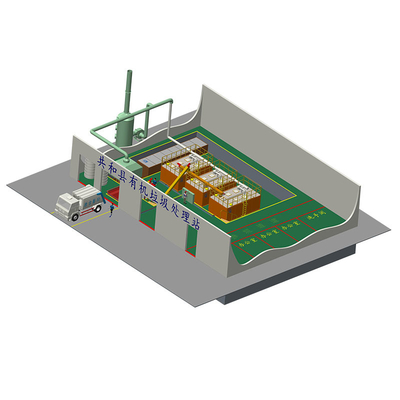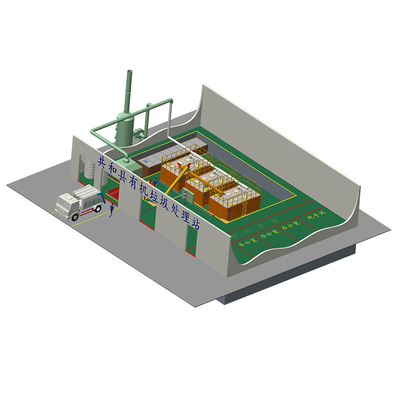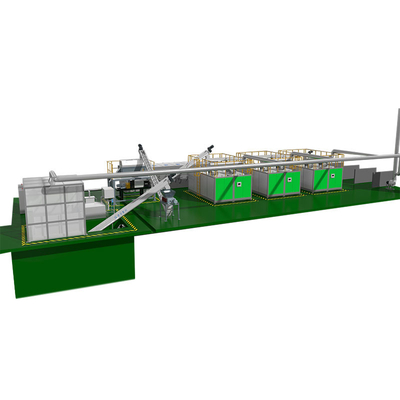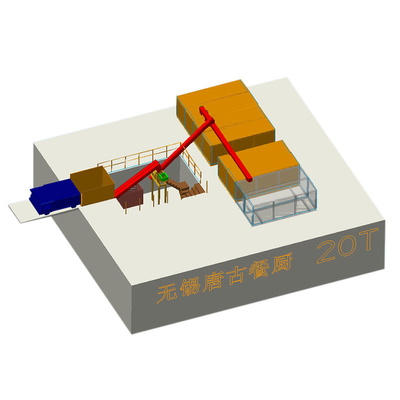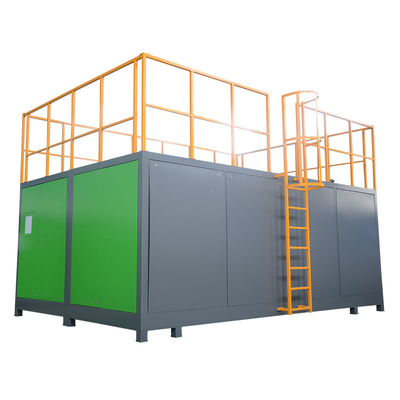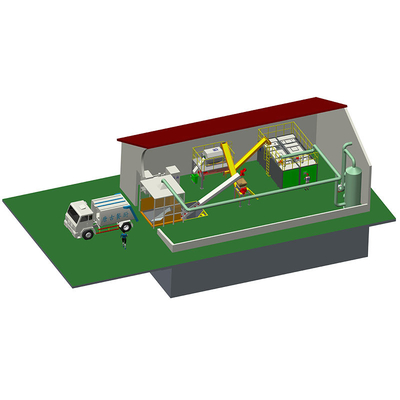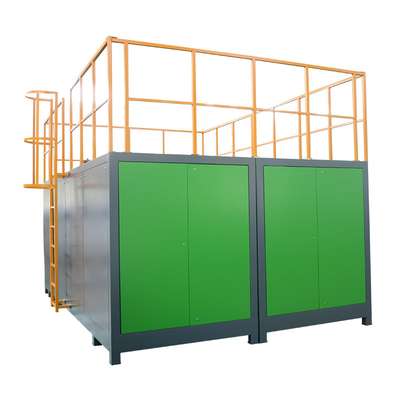High Standard BIO Automatic Organic Waste Management Solutions - 20 Tons/Day
Product Description:
Composting system is a resource utilization and harmless treatment system with strong treatment capacity, advanced technology, and a high degree of resource utilization.
Organic waste is a type of biodegradable waste of plant or animal origin, containing mainly carbohydrates, proteins, fats, etc. Organic waste comes from expired food, spoiled fruit, and vegetables, catering waste, slaughterhouse waste, etc. Normal landfill disposal is not only wasteful but also polluting (the methane gas produced by anaerobic decomposition is a greenhouse gas 20 times worse than carbon dioxide). The use of the composting system to reduce the size of organic waste and make compost, or for the production of feed is now a popular method of disposal.
Output Product: Organic Fertilizer
| NO. |
Item |
Parameter |
| 1 |
Model |
TG-CC-20T |
| 2 |
Rated Capacity |
≥20T/Day |
| 3 |
Waste Reduction Rate |
≥90% |
| 4 |
Ambient Temperature |
-10~40℃ |
| 5 |
Electrical System (Installation of Independent Meter) |
380V |
| 6 |
Processing Cycle |
24H |
| 7 |
Processing Method |
Microbial Fermentation and Hot Air Drying |
| 8 |
Control System |
Automatic Control System |
| 9 |
Heating Mode |
Electric Heating, Water Heating |
| 10 |
Fermentation Temperature Control Range |
65~75℃ |
| 11 |
Feeding Mode |
Continuous or Intermittent |
| 12 |
Noise |
65dB |
| 13 |
Coverage of Facilities |
Provided on site |
| 14 |
Main Material |
304 stainless steel is used for the main body and the part contacting materials. |
| 15 |
Host Panel |
Stainless steel, no obvious dents, scratches, and burrs, no sharp edges and corners. |
Treatment Process:
1. Organic waste is uniformly recycled and transported to the treatment station and dumped in the unloading hopper by kitchen waste transportation vehicles, spiral conveying to the crushing system, and pressing dehydration system.
2. Organic waste adopts a physical method to efficiently crush and dehydrate kitchen waste organic matter.
3. After pressing and dehydration, it will be automatically transported to the fermentation bin. After 24-hour treatment of kitchen waste, appropriate temperature, humidity, and oxygen content shall be controlled to accelerate the propagation of bacteria and improve the degradation rate.
4. After the reaction reaches a certain time, the material is discharged through mechanical mode, and the product can be used as organic fertilizer or soil conditioner.
5. For the wastewater in the treatment process, the oil and water are separated by the oil-water separation equipment, the waste oil is sold directly, and the wastewater can be treated by the later sewage treatment system.
6. In the process of kitchen waste treatment, TOGO is equipped with corresponding equipment for treatment.
Main Process: Dumping → Sorting → Discharge Auger Conveyor → Shredding → Solid-Liquid Separation → Oil-Water Separation → Fermentation → Deodorization → Output






FAQs:
1. What Is Compost?
Composting is the natural process of decomposition and recycling of organic material into a humus rich soil amendment known as compost. For any business or institution producing food waste, this organic material can be easily decomposed into high quality compost.
2. What Can Be Composted?
Fruits, vegetables, dairy products, grains, bread, unbleached paper napkins, coffee filters, eggshells, meats and newspaper can be composted. If it can be eaten or grown in a field or garden, it can be composted. Items that cannot be composted include plastics, grease, glass, and metals -- including plastic utensils, condiment packages, plastic wrap, plastic bags, foil, silverware, drinking straws, bottles, polystyrene or chemicals. Items such as red meat, bones and small amounts of paper are acceptable, but they take longer to decompose. Add red meat and bones to only a well-controlled compost pile to avoid attracting vermin, pests and insects to partially decomposed meat scraps.
3. Why Compost Food Waste?
Food waste that is not composted generally goes directly to a landfill. To date, 51 percent of Georgia?s landfills are in closure or will be closed within 5 years, and 62 percent will be closed in fewer than 10 years. On average, Georgia landfill tipping fees are between $30 and $40 per ton. As landfills fill up and close at an alarming rate, waste disposal and tipping fees to the businesses and institutions generating the waste will continue to climb. Once in the landfill, organic matter may react with other materials and create toxic leachate. Food waste placed in an airtight landfill stops the earth?s natural cycle of decomposition. This cycle plays a crucial role in the health of our environment. More than 13 million tons of food scraps were generated in 1990, accounting for 9 percent of the Municipal Solid Waste stream in the United States. This percentage can be much higher for tourist intensive areas. More than 72 percent of all materials entering landfills can be diverted through composting. Composting provides a way in which solid wastes, water quality, and agricultural concerns can be joined. An increasing number of communities, businesses, institutions, and individuals are expected to turn to composting to divert materials from landfills and to lower waste management costs. Although waste stream managers view composting primarily as a means to divert materials from disposal facilities, the environmental benefits, including reduction in water pollution, and the economic benefits to farmers, gardeners, and landscapers can be substantial.
4. Benefits of Compost to the Environment
- Water and soil conservation.
- Protects groundwater quality.
- Minimizes odors from agricultural areas.
- Avoids methane production and leachate formation in landfills by diverting organics from landfills into compost.
- Prevents erosion and turf loss on roadsides, hillsides, playing fields and golf courses.
- Drastically reduces the need for pesticides and fertilizers.
- Binds heavy metals and prevents them from migrating to water resources, being absorbed by plants, or being bioavailable to humans.
- Off-farm materials can be brought in and added to manure to make compost.
- Facilitates reforestation, wetlands restoration, and wildlife habitat revitalization efforts by amending contaminated, compacted and marginal soils.
- Off-farm materials can be brought in and added to manure to make compost.
- Composted manure weights about one-fourth as much as raw manure per ton.
5. What can I do with the compost?
The compost can be used in one of the following ways:
-
It can be used for the gardens in the premises as a soil nutrient.
-
It can be sold to the fertilizer companies or on e-commerce websites like Amazon where it can fetch Rs. 50/Kg or more.
-
It can be donated to the nearby nurseries or to the farmers and you can be a contributor to the development of the nation.
-
A local government body might collect the compost depending upon where you are.
6. What is the benefit of using TOGO over a compost pit?
There are many benefits of using TOGO over Compost Pit:
- You do not need a large area for dumping in the waste as TOGO needs a small floor space, hence saving in land costs,
- You do not need to depend on the sunlight for heating the waste inside the pit, the machine does the job for you, hence saving in time and efforts and highly convenient,
- You do not need to add sawdust or waste during the process, the machine senses and controls the humidity and temperature for you, hence saving in time and efforts and highly convenient,
- You get the compost in 24 hours straight and then you can put in the next batch of waste but with Composting Pits, you need to wait for at least 60-90 days, and
- You save on civil construction costs as the machine does not require a pit to be built
You do need to worry about the slurry or sludge formation during the monsoon season as the pit has to be kept open 365 days.

 Your message must be between 20-3,000 characters!
Your message must be between 20-3,000 characters! Please check your E-mail!
Please check your E-mail!  Your message must be between 20-3,000 characters!
Your message must be between 20-3,000 characters! Please check your E-mail!
Please check your E-mail!


